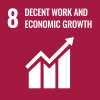The world economy is on the brink of another major downturn. Global economic growth started to decelerate on a broad front in mid-2011 and is estimated to have averaged 2.8 per cent over the last year. This economic slowdown is expected to continue into 2012 and 2013. The United Nations baseline forecast for the growth of world gross product (WGP) is 2.6 per cent for 2012 and 3.2 per cent for 2013, which is below the pre-crisis pace of global growth.
Persistent high unemployment in the United States and low wage growth are holding back aggregate demand and, together with the prospect of prolonged depressed housing prices, this has heightened risks of a new wave of home foreclosures. Growth in the euro zone has slowed considerably since the beginning of 2011 and the ever-simmering sovereign debt crisis heavily weighs on consumer and business confidence across Europe. The failure of policymakers in developed countries to address unemployment and prevent sovereign debt distress and financial sector fragility from escalating has posed the most acute risk for the global economy in the outlook for 2012-2013, with renewed global recession being a distinct possibility.
Meanwhile, developing countries and economies in transition are expected to continue to stoke the engine of the world economy, growing on average by 5.4 per cent in 2012 and 5.8 per cent in 2013 in the baseline outlook. Among the major developing countries, growth in China and India is expected to remain robust. GDP growth in China slowed from 10.3 per cent in 2010 to 9.3 per cent in 2011 and is projected to further slow to below 9 per cent in 2012-2013. India's economy is expected to expand by between 7.7 and 7.9 per cent in 2012-2013, down from 8.5 per cent in 2010.
 Welcome to the United Nations
Welcome to the United Nations
